#emr software solutions
Explore tagged Tumblr posts
Link
0 notes
Text
#Healthcare IT#HealthTech#Medical IT Solutions#EMR Support#Healthcare Software#Telemedicine Services#Medical Data Security#Healthcare Cloud Solutions
0 notes
Text
The Clinical Benefits of Electronic Health Records Systems
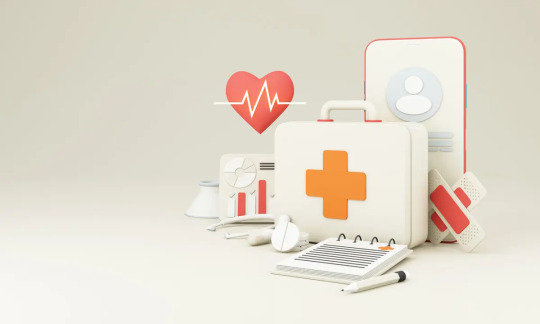
The adoption of Electronic Health Records (EHRs) began in the early 2000s, due to advancements in technology, and the need for better patient data management. In 2009, the Health Information Technology for Economics and Clinical Health (HITECH) Act was passed, which provided financial incentives through a Medicare and Medicaid EHR incentive program, later known as Meaningful Use. Between 2011 and 2015, a growing number of providers adopted EHRs to qualify for federal incentives and avoid penalties. Then in 2020, the COVID pandemic hit creating a sudden need for patients to be treated remotely. The Office of National Coordinator for Health Information Technology (ONC) estimated that as of 2020, approximately 88% of all U.S. physician offices used some form of electronic health records.
Electronic Health Records systems have provided significant benefits practice productivity and patient care. Providers gain access to patient data in real time. Everything from lab results to current medications is available at a glance. This reduces errors and supports more informed decision-making. Physicians can easily and effectively coordinate care with other providers, resulting in better patient outcomes and overall patient experience.
In addition to better patient care, EHR systems increase operational efficiency in your practice. Administrative tasks such as scheduling, eligibility, and billing insurance claims can be automated freeing up valuable time. Advanced features such as patient reminders can help reduce no-shows. Robust reporting tools that help you to analyze trends, track performance metrics, and identify areas for growth. By investing in an EHR, you’re investing in a system that can help your practice run more efficiently and prepare for future growth.
Unlock the EHR Software Benefits!
#ehrsoftware#electronic health records software#electronic health records solutoins#ehr solutions#emr systems#pronocis ehr software#emr solutions#electronic health record systems#healthtech#medical office software#top ehr software
0 notes
Text
The Triad Paradox: When Healing, Administration, and Business Growth Collide in Ophthalmology
#ophthalmology#emr#ehr#practice management software#healthcare crm#medical practice management software#ehr software#healthcare it solutions#medicalsoftware#medical software#patient scheduling software#medical practitioner#healthcare
0 notes
Text
#Clinic Management Software in Sunyani#clinic operations#Digital Healthcare Solutions in Sunyani#Electronic Health Records in Sunyani#Electronic Medical Records Software#emr software#Health Management Solutions in Sunyani#Healthcare management system#Healthcare Software in Sunyani#Healthcare Systems in Sunyani#Hospital Management Software in Sunyani#Medical Billing Software in Sunyani#Medical Practice Software in Sunyani#Medical Records Management in Sunyani#Medical Software in Sunyani#Patient Care Software in Sunyani#Patient Management System in Sunyani#Pet appointment software#Pet clinic booking software#Remote patient monitoring software#Telemedicine Software#Telemedicine Software in Sunyani#vet clinic software#Vet Software
0 notes
Text

Explore Alembico EMR, a trusted solution for managing EMR software in Ontario. Designed to simplify healthcare operations, it ensures secure data handling and efficient patient care. Choose Alembico EMR for an innovative approach to EMR Solutions and EMR Systems in Ontario.
0 notes
Text
#neurology#epr software#ehr software#emr software#Cellma#riomed#Cellma modules#hospital management software#hims software#healthcare#wellness#health#his solution
0 notes
Text
Streamline your cardiology practice with our specialized EMR software designed for efficiency and accuracy. 1st Providers Choice offers a comprehensive, user-friendly solution to manage patient records, appointments, billing, and clinical documentation. Tailored specifically for cardiology practices, our software enhances workflow, improves patient care, and ensures compliance with industry standards. Simplify your practice management and elevate the quality of care with our robust, customizable cardiology EMR software.
0 notes
Text
Enhancing Healthcare Efficiency Through Seamless EHR Integration
In today’s healthcare landscape, efficient and interconnected systems are essential for delivering quality patient care. Electronic Health Record (EHR) integration serves as the backbone for achieving this goal, offering a unified platform that connects disparate healthcare systems and streamlines operations. The growing reliance on EHR integration services highlights the need for robust integration solutions that improve clinical workflows, data accessibility, and overall patient outcomes.
Bridging Disparate Systems
Healthcare providers often use various software applications for managing clinical, administrative, and operational tasks. EHR integration solutions acts as a bridge between these systems, enabling seamless communication and data exchange. Whether it’s linking laboratory systems, pharmacy management platforms, or billing software, integration ensures that vital patient information is accessible in real-time, reducing delays and errors in care delivery.
Driving Interoperability
Interoperability is a key challenge in modern healthcare, as data silos can hinder collaboration between providers. A well-executed EHR integration addresses this challenge by aligning systems to a common standard. This ensures that data flows smoothly across platforms, empowering healthcare professionals with the information they need to make informed decisions.
Integration also facilitates compliance with regulatory standards, such as the HL7 and FHIR frameworks, ensuring data accuracy and secure sharing across healthcare networks.
Enhancing Patient-Centered Care
At the heart of EHR integration is the goal of improving patient care. By consolidating patient data into a single source of truth, clinicians can access comprehensive medical histories, including test results, prescriptions, and treatment plans. This holistic view not only enhances diagnosis and treatment but also reduces the likelihood of duplicate tests and medication errors.
Additionally, integrated systems allow patients to engage more actively in their healthcare journey. Features like patient portals provide individuals with easy access to their records, fostering transparency and trust between patients and providers.
Improving Operational Efficiency
For healthcare organizations, streamlined workflows translate into cost savings and better resource allocation. EHR integration eliminates redundancies and automates routine processes such as appointment scheduling, claims processing, and report generation. By reducing administrative burdens, healthcare staff can dedicate more time to patient care, ultimately improving service quality.
The Road Ahead
As healthcare continues to evolve, EHR integration remains a cornerstone for achieving a connected and efficient ecosystem. By bridging gaps between systems, enhancing data accessibility, and fostering interoperability, it lays the foundation for a future where technology empowers better health outcomes and operational excellence. Embracing these solutions is not just a technological upgrade but a step towards transforming healthcare delivery.
#ehr integration software#ehr integration services#ehr integration api#ehr integration#ehr integration solutions#EMR/EHR INTEGRATION#CUSTOM EHR INTEGRATION SOLUTIONS#ehr data integration
0 notes
Text
How Are EHR Software Solutions Transforming Modern Healthcare?
EMR systems and EHR systems play a pivotal role in streamlining healthcare operations by digitizing patient records and providing real-time access to medical data.
How Do EMR and EHR Systems Enhance Healthcare Delivery?
These systems improve patient care by enabling healthcare providers to track patient history, medication, and diagnostics seamlessly. By integrating with other healthcare tools, EMR systems reduce paperwork and administrative burden, allowing physicians to focus more on patient care.

EHR systems, on the other hand, go beyond capturing patient data by facilitating interoperability across healthcare organizations. These systems ensure seamless communication between providers, enhancing care coordination and improving patient outcomes.
What Makes Custom EHR Software Solutions Essential for Modern Healthcare?
Custom EHR software solutions are tailored to meet the unique needs of healthcare providers, offering flexibility and functionality beyond standard systems. They allow organizations to integrate specific workflows and features, ensuring a more efficient and personalized user experience.
Enhanced Workflow Integration: Custom EHR software solutions adapt to the workflows of different healthcare facilities, ensuring smooth operation.
Scalability: These solutions can be scaled to match the growth of the organization, making them a future-ready choice for healthcare providers.
Improved Data Security: Customization allows for enhanced security features, ensuring compliance with healthcare regulations like HIPAA.
How Do EHR Software Solutions Support Better Decision-Making?
EHR software solutions provide healthcare providers with real-time access to patient data, empowering them to make informed decisions. The availability of comprehensive patient records helps in identifying patterns, monitoring chronic conditions, and predicting potential health risks.
Additionally, EHR software solutions integrate advanced analytics tools, enabling providers to evaluate treatment outcomes and improve care quality. These insights are essential for preventive care and long-term healthcare planning.
What Are the Benefits of EMR and EHR Systems in Healthcare?
The adoption of EMR systems and EHR systems brings numerous advantages to healthcare organizations:
Improved Patient Care: These systems provide accurate and updated patient information, leading to better diagnoses and treatment.
Operational Efficiency: By automating administrative tasks, they reduce the workload on healthcare staff.
Cost Reduction: Eliminating paper records and streamlining processes can lead to significant cost savings.
Regulatory Compliance: EMR and EHR systems ensure adherence to healthcare laws and standards, reducing legal risks.
Why Are EHR Software Solutions Vital for Interoperability?
EHR software solutions are designed to promote interoperability across various healthcare settings. They enable seamless data exchange between hospitals, clinics, laboratories, and other healthcare providers. This connectivity ensures that patients receive coordinated and consistent care, regardless of where they seek treatment.
Custom EHR software solutions further enhance interoperability by allowing integration with third-party tools and legacy systems. This ensures healthcare providers can deliver efficient, patient-centric care without disruptions.
Conclusion:
EMR systems, EHR systems, and custom EHR software solutions are revolutionizing healthcare by improving efficiency, patient care, and data management. Their role in fostering interoperability and supporting informed decision-making makes them indispensable in modern healthcare.
0 notes
Text
0 notes
Text
0 notes
Text
Power Up Your Practice with Leading EMR Systems

In today's fast-evolving healthcare landscape, EMR systems play a crucial role in improving efficiency, accuracy, and patient care. These digital solutions eliminate paperwork, streamline workflows, and ensure secure data access, making them essential for modern medical practices.
The Role of EMR Systems in Healthcare
Electronic health record software is designed to store, manage, and retrieve patient data efficiently. The EMR systems in healthcare integrate clinical documentation, billing, and patient communication tools, allowing providers to focus more on patient care rather than administrative tasks.
Choosing the Best EMR Software
When selecting the best EHR software, factors like usability, compliance, interoperability, and customization play a vital role. A robust system should offer seamless integration with other healthcare tools and provide a user-friendly interface for physicians and staff.
For small and independent practices, finding the best EMR for small practice is critical. The ideal solution should be cost-effective, scalable, and easy to implement without extensive training or IT support.
Why Choose PrognoCIS EHR?
PrognoCIS EHR is a top-tier solution tailored for healthcare providers of all sizes. Its intuitive interface, customizable features, and seamless integration with billing and practice management make it one of the best EMR software choices available. Whether you're a small practice or a multi-specialty clinic, PrognoCIS enhances efficiency while ensuring compliance with industry standards.
Ready to transform your practice? Get started with PrognoCIS EHR today!
#best emr software#best ehr software#electronic health record software#emr solutions#affordable ehr software#affordable emr software#electronic health records solution
1 note
·
View note
Text
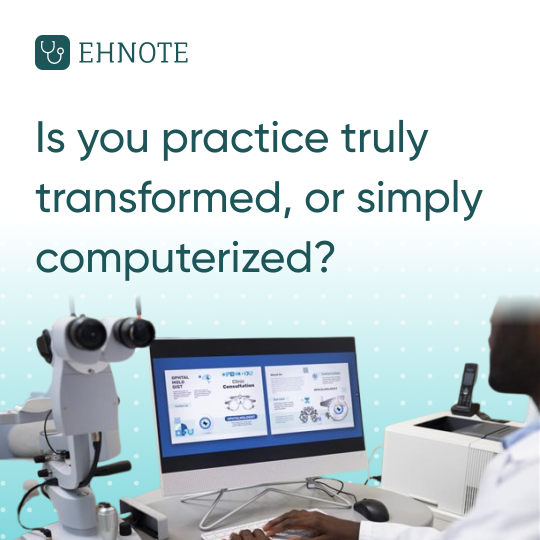
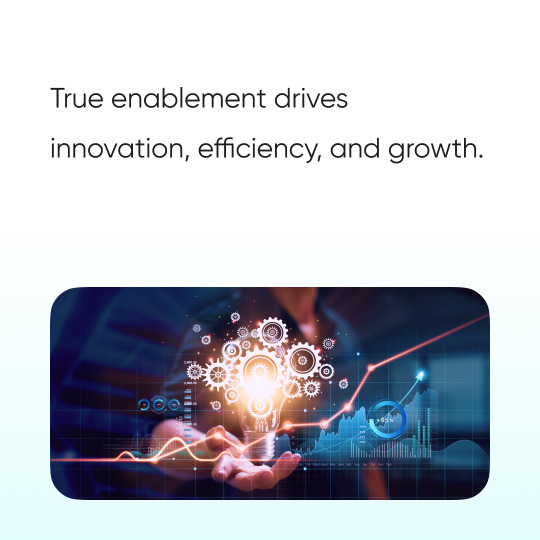
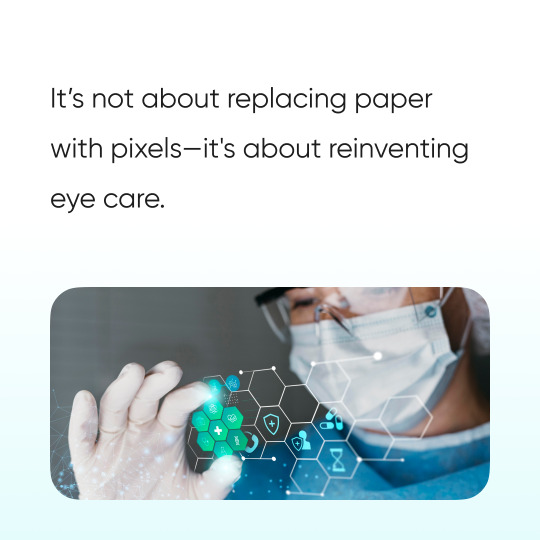
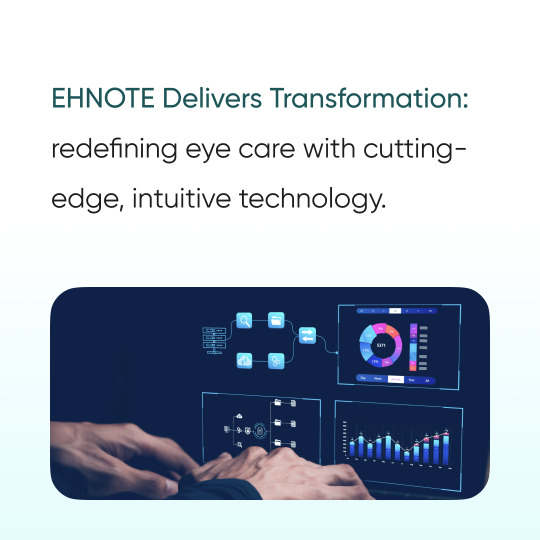
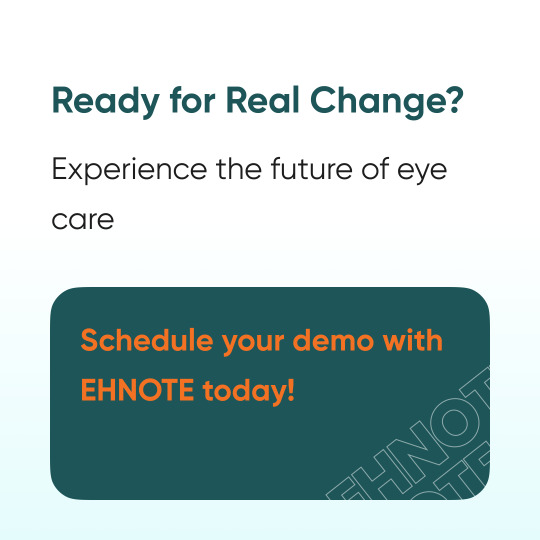
Digital or Just Computerized?
At EHNOTE, we believe digital enablement means reinventing eye care—not merely swapping paper for pixels. Our cutting-edge, intuitive technology drives innovation, efficiency, and growth.
Schedule your demo today and experience the future of eye care!
#ophthalmology#practice management software#ehr#emr#healthcare crm#ehr software#medical practice management software#ophthalmology ehr emr software#healthcare it solutions#dental ehr emr software
0 notes
Text
Save Time and Enhance Care with NiftyHMS Prescreening
Patient prescreening helps clinics save time and focus on care. By using NiftyHMS, patients can share their symptoms and medical history online before visiting the clinic, making appointments faster and more efficient.
Key Features:
Self-Service Portal: Patients describe symptoms online.
Medical History Capture: Collects patient records in advance.
Customizable Templates: Fits your clinic’s specific needs.
Save Time at the Clinic: Reduces waiting and paperwork for OPD visits.
NiftyHMS simplifies healthcare with easy-to-use tools for clinics and patients.
Read More: https://niftyhms.com/blog/do-electronic-medical-records-improve-quality-of-care/
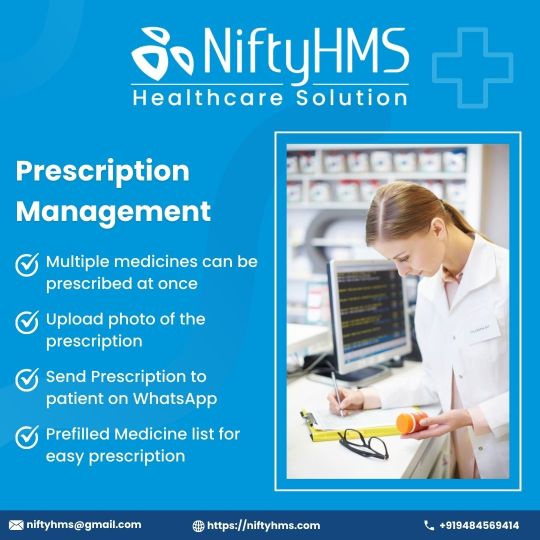
#ehr software#Electronic Health Records#Electronic Medical Record Systems#Electronic medical records#EMR software#EMR/EHR Implementation#Health IT Solutions#Medical Practice Management Software#Medical Record Software#Patient Record Management#Medical records management#Medical tourism in India#Medical travel to India#Online doctor appointment on WhatsApp#OPD management solutions#Patient monitoring#Queue management system#Reducing hospital wait times#Remote patient monitoring with AI#Siddha treatments in Kerala#Top medical tourism destinations#Virtual consultations for patients#WhatsApp appointment booking system#WhatsApp appointment scheduling#WhatsApp online appointment booking#World-class hospitals in India
0 notes